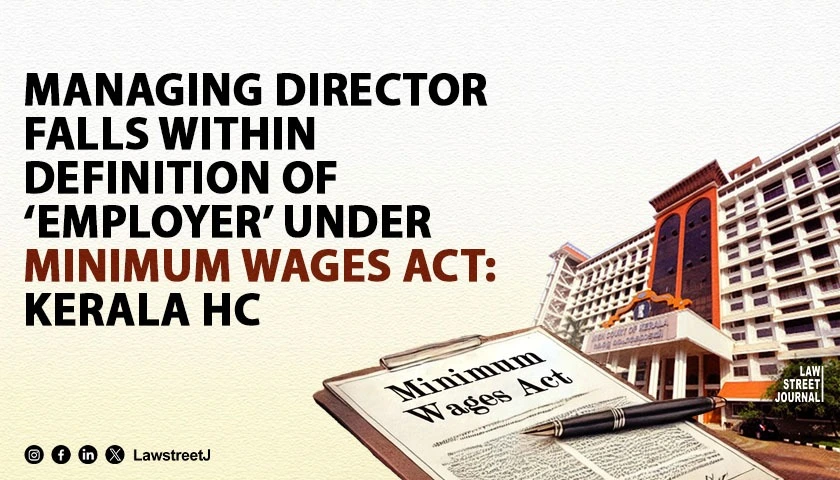Kerala: The Kerala High Court has held that the Managing Director of a company can be treated as an “employer” under Section 2(e) of the Minimum Wages Act, 1948, for the purpose of proceedings initiated under Section 20(2) of the Act.
Justice K. Babu delivered the judgment on October 30, 2025, while dismissing W.P.(C) No. 26208 of 2025 filed by Bhavesh Anil Kumar, former Managing Director of Southwest Motorcorp India Pvt. Ltd., who had challenged an order issued by the Deputy Labour Commissioner, Kannur, under Section 20(3) of the Act.
The case arose from an inspection conducted by the Assistant Labour Officer, Hosdurg, in 2018, during which it was found that 19 employees of the company had been paid less than the prescribed minimum wages. A claim petition was subsequently filed against the petitioner under Section 20(2) seeking payment of the wage shortfall. The Deputy Labour Commissioner allowed the claim and directed the petitioner to pay the difference.
The petitioner contended that the proceedings should have been initiated against the company, which continues to exist, and not against him personally. It was argued that the Managing Director could not be held liable since the obligation to pay minimum wages rests solely with the employer company. He also claimed that he had resigned pursuant to a share purchase agreement executed in 2022 and that he was not given sufficient opportunity to contest the proceedings.
Rejecting these contentions, the Court examined the definition of “employer” under Section 2(e) of the Minimum Wages Act, which includes “any person responsible to the owner for the supervision and control of the employees or for the payment of wages.” Justice Babu noted that during the relevant period from November 2017 to April 2018, the petitioner was the Managing Director and was responsible for supervision and control of the employees.
Relying on the decision in Thankamma v. Regional Joint Labour Commissioner, Kollam (2025 KHC 846), which dealt with a pari materia provision under the Payment of Gratuity Act, 1972, the Court held that a Manager or Managing Director is a statutorily recognized person to be treated as an “employer” for proceedings under the Act.
Justice Babu observed that “the Managing Director of the company under consideration is a statutorily recognized person to be treated as the ‘employer’ as defined under Section 2(e) of the Minimum Wages Act in a proceeding initiated under Section 20(2) of the said Act by the competent authority.”
The Court further rejected the petitioner’s reliance on the Supreme Court’s judgment in Dayle De’Souza v. Government of India, clarifying that the case concerned prosecution under Section 22A of the Act, where the company itself had not been arraigned as an accused, which was not comparable to the present proceedings under Section 20(2).
The Court also examined the share transfer agreement relied on by the petitioner, noting that it expressly provided that the sellers would be responsible for all statutory liabilities up to the date of execution of the agreement. Since the minimum wage liabilities related to the period 2017–2018—prior to the 2022 transfer—the Court held that the petitioner remained liable.
Finding no procedural irregularity or denial of opportunity, Justice Babu concluded that the impugned order was valid and binding on the petitioner in his capacity as “employer.”
The writ petition was accordingly dismissed.
Appearances: Kala G. Nambiar, Advocate, appeared for the petitioner, while V.K. Sunil (Sr. GP) appeared for the respondent.
Case Title: Bhavesh Anil Kumar v. Assistant Labour Officer & Deputy Labour Commissioner, Kannur.




![Kerala HC Quashes 498A Dowry Harassment Case Against Live-In Partner, Citing Lack of Relative Status [Read Order]](/secure/uploads/2023/08/lj_5693_1057c042-1e57-4e27-8c9e-25af0ec38ec4.jpg)
![Watching porn on mobile: Kerala HC highlights importance of mother cooked meals, outdoor sports [Read Order]](/secure/uploads/2023/09/lj_9155_Parental_supervision_of_mobile_phone_usage.jpg)
![Lakshadweep MP Mohammed Faizal Disqualified from Lok Sabha After Conviction Suspension Plea Rejected by Kerala High Court [Read Notice]](/secure/uploads/2023/10/lj_9640_87b5fd97-0e05-4ff8-9a99-3be1e4446192.jpg)




